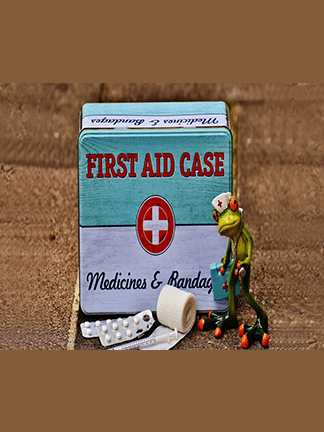I can't stress enough the importance of having a well-stocked medicine cabinet at home, especially if you have a baby or young toddlers. I have little twin boys and if there's something I know for sure is that when one is sick, the other is sure to fall sick too. Schools are unfortunately where a lot of children fall sick, catching the bugs from one and another. The adage better to be safe than sorry rings true here, and having a well-stocked medicine cabinet at home was priceless for me because it meant that I didn't have to run to the doctor for small things like colds, sniffles, small cuts and bruises, or even a mild stomach flu.
Having the right medication at hand is vital to ensure a quick recovery and prevent the spread of germs to other people in the house.
Here are the 5 most important things that I highly recommend you have in your medicine cabinet:
1. Thermometer
It doesn't matter if it's a manually read one or a battery-operated one, but it is essential to have one on hand since young children are very susceptible to fever. Knowing if your child has a fever and exactly how much is critical for early treatment to stave off infections. As a parent, I would recommend getting the battery-operated thermometer, because my kids quickly learnt how to place the thermometer under their tongue for a reading, how to read the temperature after the thermometer beeps, and how to read the temperature to understand that anything over 37.2 degrees is considered a fever.
2. Plasters
When my boys were younger and learning to walk, they were always coming back with small bruises from their outdoor adventures in the park. It’s easy to take care of small scrapes and scratches to keep the germs out with normal plasters – and there are many animated themes for young children too, so they are happy to wear them like a badge of honour. Mine certainly did (and I’m convinced sometimes they just faked an injury to get a superhero plaster).
3. Calamine Lotion
Used to treat mild skin conditions such as itchiness, dryness, sunburn, eczema and even to take the sting out of insect bites. But the soothing lotion was very helpful to my family since my children both have eczema, and the lotion helped soothe the itchy skin.
4. Cold & Flu Medication
Nasal sprays are helpful and extremely useful for children down with common cold.
BETADINE™ Kids Cold Defence Nasal Spray is safe and clinically suitable for kids above the age of one year. The nasal spray helps stop colds early by trapping and eliminating 99% of the common cold and flu viruses. It is natural, drug-free, steroid-free, and preservative-free, clinically proven to shorten the duration of colds by up to 2 days, so there is no downside in using these products, unlike other medication that are often steroid-based.
I'm sure you'll find having a well-stocked medicine cabinet very helpful, but remember, that it's ok for treating small symptoms and easy things like minor wounds and sore throats. But if things do not get better or you find that your child’s condition is actually deteriorating, please seek professional medical advice as soon as possible.
